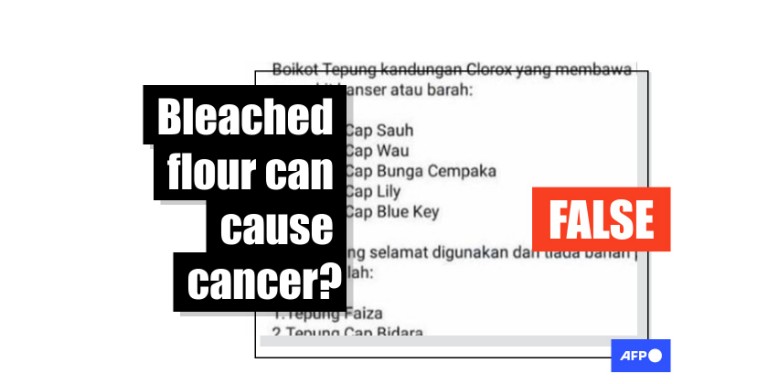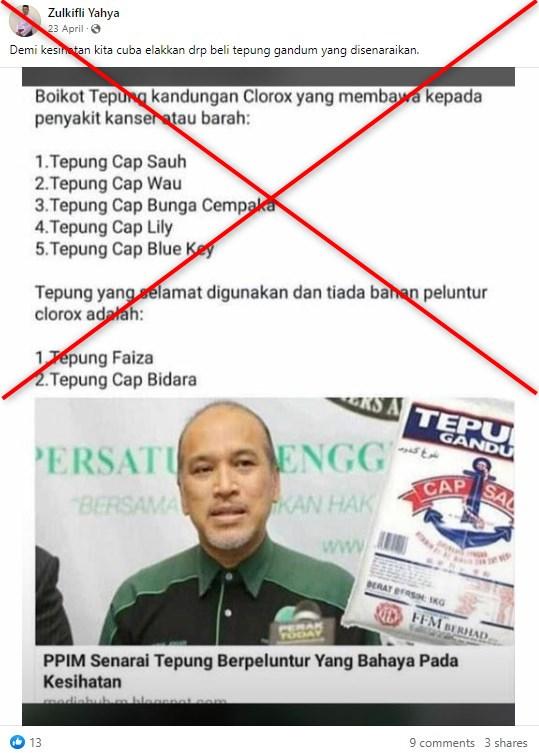
Experts refute false claim that food additives in flour cause cancer
- This article is more than one year old.
- Published on June 3, 2024 at 05:57
- Updated on June 10, 2024 at 09:31
- 3 min read
- By Najmi Mamat, AFP Malaysia
"Boycott Flour containing Clorox that leads to cancer," read part of the text in an image shared on Facebook on April 23, 2024.
It listed five flour brands that purportedly contained Clorox -- a popular household cleaning product -- and two others it said were safe to consume.
The image also featured a link to a blog post that cited Nadzim Johan, president of the Malaysian Muslim Consumers Association (PPIM), as the source of the claim but did not mention when he supposedly made it.
However, in a Facebook video from September 2017, he could be seen similarly saying Malaysians consume cancer-causing flour that had been whitened using Clorox.

Similar posts citing Nadzim were also shared on Facebook here, here, here and here as well as on TikTok.
Facebook posts with similar claims surfaced in Malaysia in 2012 and have been reshared in 2014 and 2017.
Experts said, however, that the bleaching agents used in flour differ from those used for cleaning agents. There is also no evidence that these can cause cancer.
Fatimah Salim, director of Universiti Teknologi MARA's Atta-Ur-Rahman Institute for Natural Product Discovery in Malaysia said that Clorox usually contains sodium hypochlorite, an oxidising agent that can kill bacteria and viruses (archived link).
By contrast, the bleaching agents used to process flour are chlorine gas, benzoyl peroxide and bromine, she said.
She explained that these bleaching agents are used to whiten flour -- naturally yellowish due to the presence of carotenoid pigments -- and improve its baking qualities.
"While both types of bleach involve chemical reactions that alter the colour of substances, they are used for different purposes and are not interchangeable," she said.
Mohd Redzwan Sabran from Universiti Putra Malaysia's Department of Nutrition also told AFP on May 16 that "it's crucial to distinguish between bleaching agents sanctioned for food use and chemical solutions intended for cleaning purposes" (archived link).
No definitive evidence
Fatimah told AFP that while exposure to high levels of chlorine gas can be harmful and in worst cases, fatal, and there is a risk of benzoyl peroxide producing benzene -- a known carcinogen -- the levels present in bleached flour are "generally recognised as safe" for consumption by regulatory agencies such as the US Food and Drug Administration (FDA).
"Studies have shown that the levels of benzene formed from benzoyl peroxide in bleached flour are generally very low and unlikely to pose a significant health risk," she told AFP in an email on May 22, 2024.
Redzwan also said "there is no evidence" at present that benzoyl peroxide causes cancer in humans, citing the assessment of the International Agency for Research on Cancer (archived link).
The Ministry of Health in Malaysia said it analysed flour samples in the brands specified by PPIM in 2017 and found they did not exceed the legal limits for benzoyl peroxide content.
The ministry affirmed on April 27, 2024 that the benzoyl peroxide content in flour brands was "safe for use" and within specified limits (archived link).
The Food Regulations 1985 under the Food Act 1983 permitted using benzoyl peroxide as a food conditioner in flour up to 50 milligrams per kilogram (archived link).
Meanwhile, the Codex Alimentarius Commission standards body under the Food and Agriculture Organisation and the World Health Organization set a maximum of 60 milligrams of benzoyl peroxide per kilogram of wheat flour (archived link).
AFP has previously fact-checked misinformation related to food safety in Malaysia here and here.
This story was updated to change the title of Fatimah Salim.June 10, 2024 This story was updated to change the title of Fatimah Salim.
Copyright © AFP 2017-2026. Any commercial use of this content requires a subscription. Click here to find out more.
Is there content that you would like AFP to fact-check? Get in touch.
Contact us
